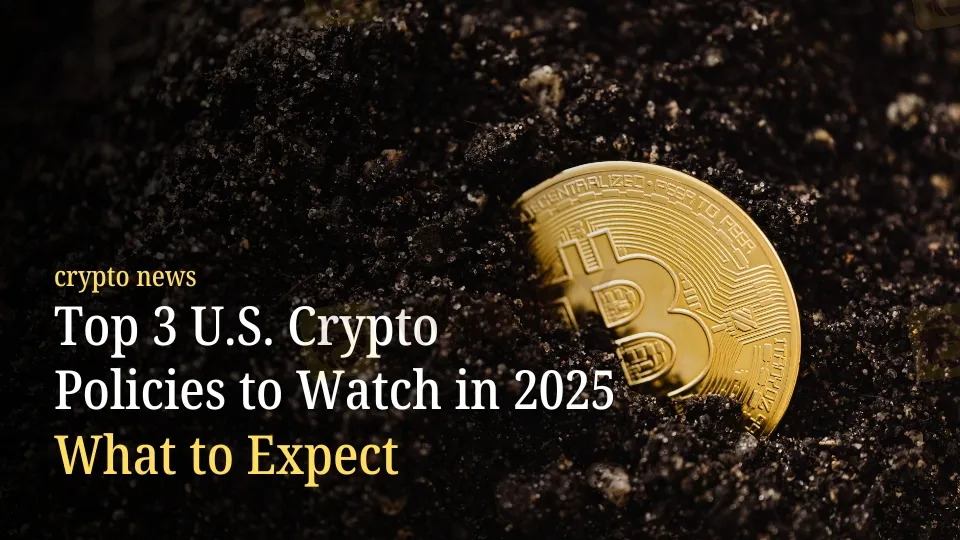Abstract:Get ready for 2025! From stablecoin rules to SEC vs. CFTC oversight and a bold Bitcoin reserve plan, here’s what to watch in U.S. crypto policies.

The 119th United States Congress is officially in session, and the cryptocurrency community is waiting for what will happen. Stakeholders want clear, supporting policies for digital assets and stablecoins, which might change the financial environment.
President-elect Donald Trump has pledged to establish the United States as the “crypto capital of the planet.” His campaign pledges invigorated the business, and the 2024 elections resulted in 250 “pro-crypto” House members and 16 like-minded senators, according to the NGO Stand With Crypto.
While these developments lay the groundwork for substantial regulatory changes, a vital component remains missing: real rules that can be implemented. The potential for change is great, especially since prominent crypto advocates are expected to lead significant agencies like as the Securities and Exchange Commission (SEC) and the Department of Commerce. However, the journey from intention to law is still unknown.
As the new government takes office, here are three key areas of crypto policy to monitor.
Will Stablecoin Regulations Finally Be Clear?
Stablecoins are one of the most highly anticipated legislative initiatives. These digital assets, which are tied to fiat currencies such as the US dollar, are essential to the crypto ecosystem. Nonetheless, regulatory ambiguity has put the market in limbo.
Last year, the House Financial Services Committee's bipartisan negotiations came close to producing stablecoin legislation. Meanwhile, Europe pushed on with its Markets in Crypto-Assets (MiCA) framework, which directly addressed stablecoin regulations.
A fundamental area of contention in the United States is whether stablecoins must be completely backed one-to-one by US dollars. Marta Belcher, head of the Filecoin Foundation, claims that such rules would subject stablecoins to more scrutiny than other financial sectors. With both parties moving closer to an agreement, 2025 might be the year the United States follows Europe's lead—or forges its own course.
SEC vs. CFTC: Whos the Boss of Crypto?
The disagreement over whether the SEC or the Commodity Futures Trading Commission (CFTC) has power over certain crypto assets continues to impede progress. The SEC classifies several cryptocurrencies as securities, but the CFTC classifies others, such as Bitcoin and Ethereum, as commodities.
This regulatory tug-of-war has left crypto companies unsure of their legal duties. Tokens categorized as securities must comply with stringent registration requirements, whereas commodities have fewer constraints. This uncertainty frequently drives innovation elsewhere, putting the United States at a competitive disadvantage.
It is vital to resolve this jurisdictional issue. It might offer the sector much-needed clarity while also paving the path for expansion within the United States.
A Bitcoin National Reserve: Visionary or Unrealistic?
One of the more audacious suggestions on the table is the establishment of a Bitcoin national reserve. According to Trump advisers, this strategy would include protecting current government-held Bitcoin while also purchasing more to strengthen the nation's crypto leadership. Such a move would establish the United States as a leading sovereign holder of Bitcoin, thereby increasing worldwide trust in the country's cryptocurrency sector.
Although appealing, this concept has practical and political challenges. It would be critical to coordinate efforts among Congress, the Federal Reserve, and the Treasury. Though adoption appears to be a long shot, the proposal demonstrates the administration's readiness to think large about crypto's position in national policy.
Final Thoughts
The crypto sector, like the US government, is at a crossroads. While President Trump's pro-crypto position and legislative momentum are encouraging, real development will be dependent on balancing innovation and supervision. The potential for attracting talent and investment to the United States is evident, but without clear and equitable laws, the dangers remain enormous.
According to Ripple CEO Brad Garlinghouse, the “Trump effect” has already restored industry optimism. However, politicians operate at a slower pace than innovation, and if urgent action is not taken, the United States will slip behind global competition.
The year 2025 may be a watershed moment. Will the United States grasp the opportunity to lead, or will divided policies stifle it? The answer is found in Washington's capacity to act quickly and wisely.










